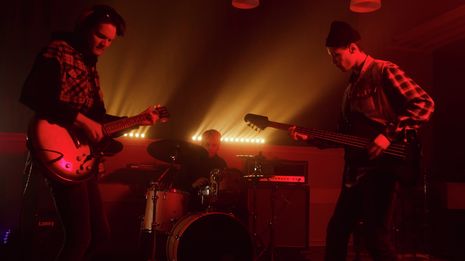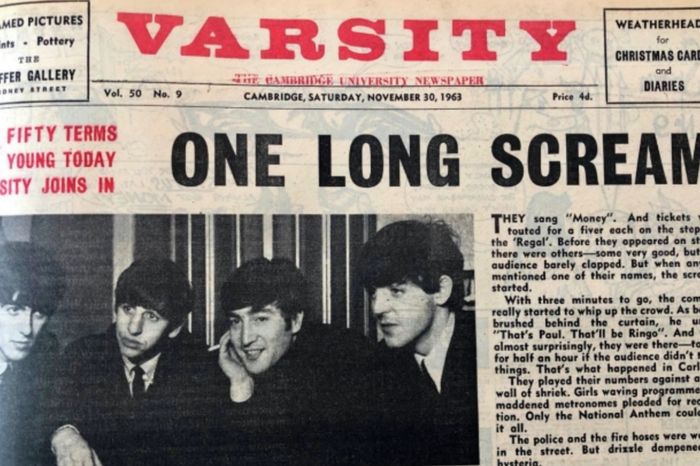What’s the problem with Cambridge’s band scene?
Danny Petrie on why Cambridge’s student bands are missing the creative spark they need to make it big outside of the cobbles

Some of the best nights I’ve had in Cambridge were thanks to its student bands. I’ve spent many evenings dancing to funkified pop hits played by some of the university’s bigger bands, like Hot Content, Soft Crunchy Landing, and Colonel Spanky’s Love Ensemble. However, I am rarely both sober and genuinely excited by what a Cambridge student band is creating. Despite the abundance of talent in the city, many popular bands play what feels like a 2010s ‘Now That’s What I Call Music’ playlist — rarely offering much of interest (with exceptions, of course).
While I have the utmost respect for these bands and the talented musicians within them, the fact that these are the most prominent bands in Cambridge seems indicative of something about the student music scene: a lack of both original music and a depth of genre. In Glasgow, it’s hard to escape the mix of art rock, ska-metal, electric boogaloo, and other eclectic genres that make up the student music scene. When I visit friends elsewhere, they often have stories of sitting through an hour of nintendocore by a 45-year-old postgrad or having one of the best nights of their lives at a Polish math-rock gig. I can’t help but wonder where this part of the student experience is in Cambridge.
“So why does Cambridge not produce the Stephen Frys and Emma Thompsons of the music industry?”
This seems to be a long-standing issue in the band scene here. The university’s impact on music is relatively minor compared to its contributions in other artistic fields. We have few notable bands or musicians to boast of, other than Clean Bandit, Sports Team, and Henry Cow (and if I’m honest, I’d never heard of that last one). So why does Cambridge not produce the Stephen Frys and Emma Thompsons of the music industry?
In my opinion, music at our university has fallen victim to the widespread ‘efficiency’ mindset. With heavy workloads, people value their free time too much to risk spending an evening watching a small, unknown band. As a result, Events Officers are reluctant to take risks too, and we end up with the same funked-up Bruno Mars tracks on repeat. This discourages small bands from creating original music or experimenting with different genres, creating a barren and shallow musical landscape, where only bands playing acoustic Dizzee Rascal covers can survive. While it’s an established part of the music business that small bands must ‘pay their dues’ before achieving success, our university offers no space for bands to even do that, let alone succeed.
Music at the university suffers from this in a way that other arts don’t. The young thespians and playwrights of Cambridge have creative and experimental spaces, which don’t exist for music. The success of student plays like Blackboard (Keep ya’ head up) and Jellyfish Brain shows the value of such a space. It’s not uncommon to hear about students spending their evening watching a student-written play, but when was the last time your mate said they were going to see a student band playing original music?
“Original and creative bands exist, such as Quasar, Temor, and East Street on a Tit, who all made it to the final of the CMP Battle of the Bands last year”
While this article has been a bit doom and gloom, I want to highlight that I don’t think the music at this university is bad. Original and creative bands exist, such as Quasar, Temor, and East Street on a Tit, who all made it to the final of the CMP Battle of the Bands last year. These are all student jazz-ish bands, playing mixtures of originals and covers, and are great staples of the music scene. Notice how these are all jazz bands, which I believe is a credit to the work of the Cambridge Jazz Society. The society fosters a great, accessible, and supportive culture for both bands to perform and for like-minded musicians to meet. This has had a genuine effect on the wider university music scene, spilling over into places like Clare Jazz Club. The student jazz scene in Cambridge is well and truly alive, and I think it holds the key to creating a richer, deeper, and more creative music scene: an audience willing to take the risk of hearing new music.
Cambridge’s electronic music scene tells another story, with talented DJs becoming staples of student life, despite some complaints about the wider city’s EDM scene. In contrast, bands face the opposite problem: venues like The Portland Arms and The Six Six host great original artists, but few from the university. The appetite for fresh music is clear from the success of events like The Cambridge Northern Soul Train, showing that students can be drawn to new musical experiences.
So how can we change the music culture in Cambridge? Well, the obvious answer is giving everyone more free time, but that doesn’t seem likely to happen any time soon. I believe the onus is on both the artists and the listeners to create a scene in which original compositions and novel genres are welcomed. At the same time, bands must be willing to take risks in both genre and composition. Be bold, make students want to come see you, and maybe forego the May Ball gigs for the sake of the greater good. Perhaps this way, in 20 years, when we talk about famous people from The University of Cambridge, they won’t just mention Stephen Fry — they’ll be talking about a group who used to play at your college bar every Friday night.
 News / Cambridge academics sign open letter criticising research funding changes22 February 2026
News / Cambridge academics sign open letter criticising research funding changes22 February 2026 News / Supporters protest potential vet school closure22 February 2026
News / Supporters protest potential vet school closure22 February 2026 News / University Council rescinds University Centre membership20 February 2026
News / University Council rescinds University Centre membership20 February 2026 News / Hundreds of Cambridge academics demand vote on fate of vet course20 February 2026
News / Hundreds of Cambridge academics demand vote on fate of vet course20 February 2026 News / Union cancels event with Sri Lankan politician after Tamil societies express ‘profound outrage’20 February 2026
News / Union cancels event with Sri Lankan politician after Tamil societies express ‘profound outrage’20 February 2026










